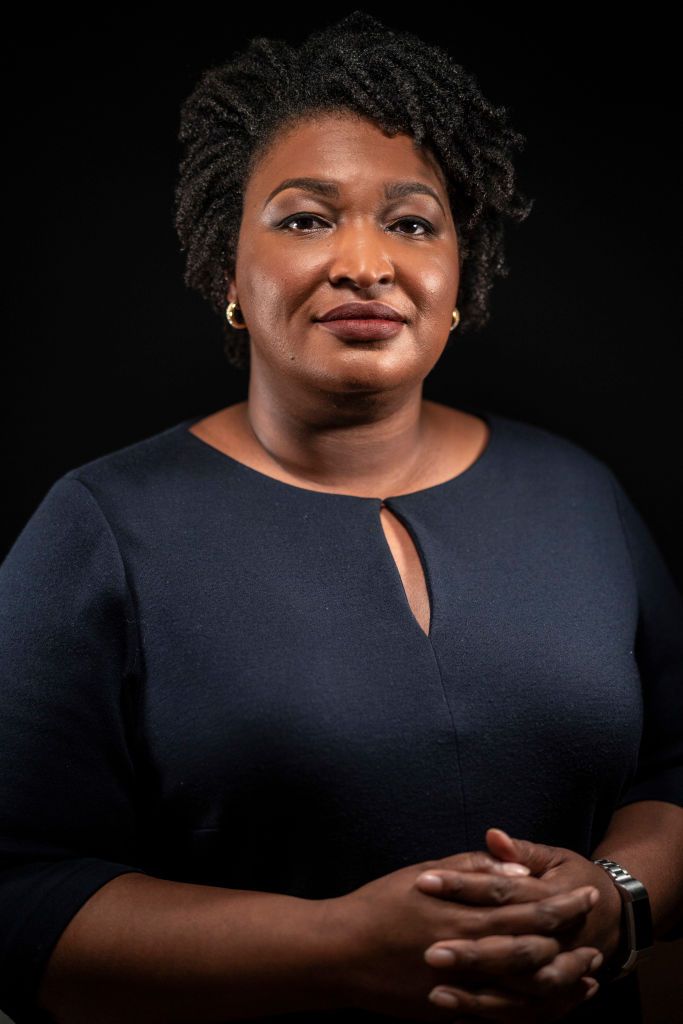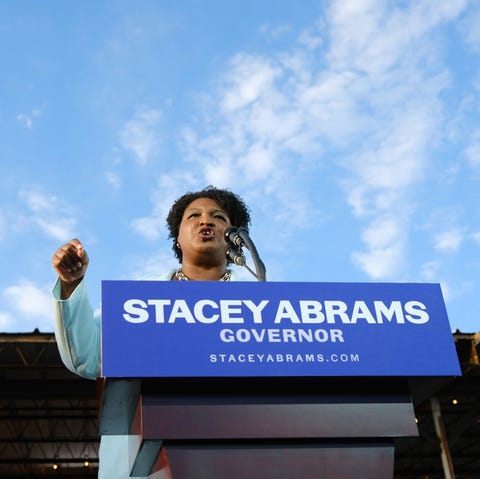Stacey Abrams Changed Her Mind About Abortion—and She Thinks Others Can Too
In the aftermath of the Supreme Court’s decision to eliminate the constitutional right to abortion, Stacey Abrams is not mincing words. “We’re not quite in dystopia,” she tells ELLE.com. “But we can see it forming.” In Georgia specifically, where Abrams is currently running for governor, a six-week abortion ban is expected to soon take effect, outlawing most abortions before many people know they’re pregnant. “It makes it dangerous to live in Georgia, because we are criminalizing the provision of medical care in a state that already faces an extreme doctor shortage,” Abrams says. (Georgia also has the second highest maternal mortality rate in the nation.)
Throughout her time as a politician, Abrams has always been this openly pro-choice, but she didn’t grow up that way. “I was never told to be anti-abortion; it was just in the atmosphere,” she says. But after a friend challenged her views in college, Abrams slowly started to see abortion care as what she now calls an important medical decision.
Now, it’s the denial of that care—coupled with recent attacks on voting rights and the LGBTQ+ community, racial violence, and more—that’s forming the dystopia Abrams sees on the horizon. “The incredulity we have enjoyed as Americans, this idea that, I just don’t believe that can happen, that’s just not who we are—it is becoming who we are,” she says. “Our only ability to defeat the darkness that is consuming us is believing the darkness is real.” And after that? Abrams is adamant about the need to vote this November, at both the state and federal level. “We cannot spend the next two years in recrimination because we’re angry we didn’t get what we wanted,” she says. “We can demand more, but we also have to push for more. And the way we push for more in a democracy is electing people who reflect our values and who are willing to do the work we hire them to do.” As for how she would protect abortion rights as governor—plus what she says to others who are anti-abortion—Abrams discusses that and more, below.
Where were you when you first heard the news about Roe v. Wade being overturned?
I was at the Democratic Governors Association having a discussion about rural issues, and one of the points I was making was about the importance of rural health care. I came off the panel and was pulled aside by my staffer who said the Dobbs decision had come down. It was the same sense as when we saw the leaked opinion, which is that I’m enraged, and I’m appalled. The one issue is that I was not surprised. We have seen a very intentional move over the last 20 years to roll back fundamental human and civil rights. And in the United States, the most sinister and pernicious approach is to send the protection of those rights to the state, essentially saying the state has the ability to determine the quality of citizenship and the quality of humanity. Having grown up in the South, I know that pattern of devolution is always to the detriment of vulnerable, marginalized, or disadvantaged communities.
Now there could soon be a six-week abortion ban in Georgia. What have you been hearing from constituents?
They are deeply concerned. Many didn’t realize that Georgia had already had such an extreme ban. Brian Kemp banned [abortion] in 2019, but because it was immediately enjoined, most Georgia women were unaware that this was looming. So the first reaction has been shock. They did not know Georgia was one of those states that would essentially ban abortion, because while it is a six-week ban, that is before most women know they’re pregnant. And because of our shortage of health care workers, it is long before many can get an appointment.
There’s also language in the legislation about “fetal personhood.” For people who might not know, can you explain what that means and the ramifications of language like that?
Personhood, essentially, grants rights and privileges to fetal tissue. What that means in practice, we believe, is that you can claim a fetus on your taxes. You can try to seek insurance. You should be able to pursue questions of child support. But it also then creates another layer of potential criminal exposure for women. For example, the law ostensibly says that you cannot be held accountable for miscarriages. The question is: How do you prove it? Is the onus on the woman to prove that, in one of the most vulnerable and tragic moments, this was spontaneous miscarriage? How do you prove that? And are you then subject to the investigation of your body and your life by a prosecutor who does not believe you? It happened in Texas. So this goes beyond the basic notions of denying simple medical care to enshrining in Georgia’s constitution a set of rights that are beyond, I think, the scope of what most Georgians understand or have previously discussed.
If you’re elected this year, how would you work to expand reproductive rights in Georgia? You’ve spoken about viewing abortion as a medical decision, but can you clarify what type of abortion laws you would and would not support as governor?
When I say it is a medical decision, that means we treat it in the law as a medical issue. The law does provide parameters, but those parameters leave to the discretion of a doctor the application of those parameters. For me, the issue would be that abortion is legal, abortion care is legal, and that only at viability would there be any prohibition. That would be subject to there being any danger to the woman’s life or health, and that would be determined as a medical issue by a doctor.
You’ve also spoken about growing up anti-abortion, but now you’re pro-choice. What was happening in your life that prompted you to shift your opinion?
One was going to Spelman College, one of two predominantly Black women’s colleges in the nation. It was in that space that one of my dear friends—we had a common religious upbringing—told me that she was volunteering with Planned Parenthood. I recoiled, because in my mind, that was anathema to our faith. And she challenged me. She asked me why. It was the first time I’d had an active conversation about my belief. I was never told to be anti-abortion; it was just in the atmosphere. It was the presumption. And after the conversation with my friend at Spelman, I spent more time thinking about it. I didn’t change my opinion overnight, but I became more and more willing to listen and to investigate on my own.
By the time I finished law school, I was moving very much toward the side of being pro-choice; I just didn’t articulate it in that way. I was helping elect people who were starkly pro-choice, but I didn’t use that language to describe myself, until I was really confronted with it. When I got ready to run for office, that for me was the turning point, because I had to be able to articulate: How would I vote in public? How would I represent people? That was the concretizing moment for me, where it went from being what I thought and believed to how I had to publicly act.
How do you use that experience to now talk to other people who might not agree with you? How do you recommend other people do the same in their own lives?
If we truly believe this is a conversation about choice, we have to allow for people to want to make a different choice. But this is about decisions that are private and personal and fraught. So my first responsibility is to be compassionate in my conversation but intentional in my language, which is why it’s important that we characterize this as it is, which is a medical decision. When you are talking about a woman’s health, a woman’s life, that is a very different frame than an esoteric political conversation.
It also gives people permission to have a broader conversation, to do what my friend did for me by creating space for me to ask questions. She didn’t castigate me. She didn’t tell me I was wrong. She didn’t dismiss me and say that there was something inherently flawed in my approach. She created an opportunity for me to think about an issue without believing I was violating my internal moral compass or being disingenuous in the conversation. Part of my job as a legislator, as a leader, was that I had to work with members of my own caucus who are anti-abortion. I didn’t castigate them. I talked about why the bills that we needed to defeat mattered. I talked about what they could do, what were the boundaries of their participation. I created space for them to create space for others. That’s how we have to approach this. There are those who use invective and vitriol, but we cannot meet that anger with anything less than the righteousness of knowing that we are trying to protect the lives and the autonomy of women.
My mother and father lived in Mississippi when Mississippi was considering its personhood amendment, and I called my parents to ask what they were thinking. My parents were Methodist ministers in Mississippi, and both of them said, “We’re voting against that.” It shocked me, until I thought about it. Who I am was formed by these two people, and for them, it was a question of should they be able to put into the constitution a denial of medical treatment to women? And they unequivocally said no, that’s not who they are. That is what we have to be able to do.
This interview has been edited and condensed.
This content is created and maintained by a third party, and imported onto this page to help users provide their email addresses. You may be able to find more information about this and similar content at piano.io


